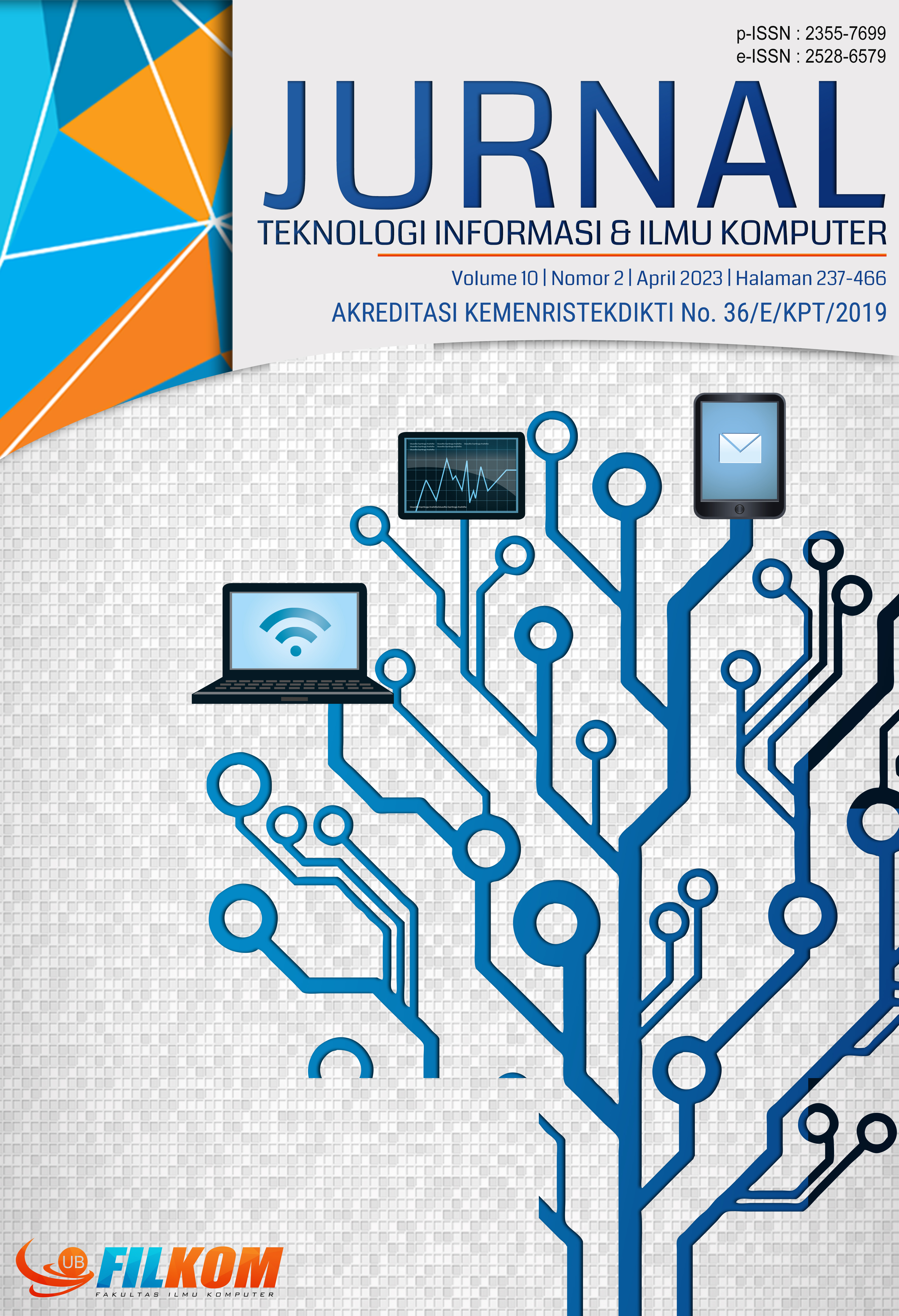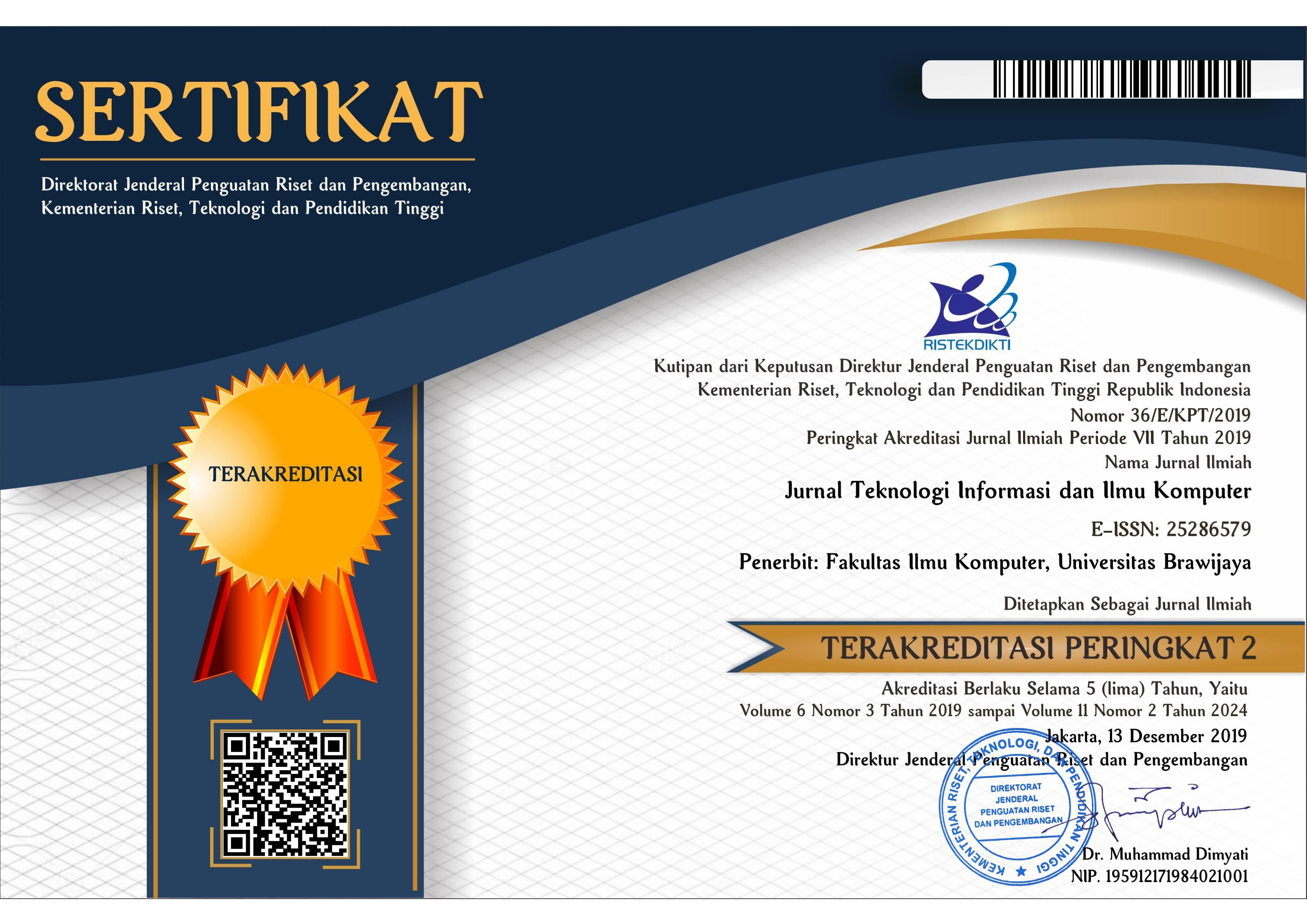Pendekatan Ensemble untuk Analisis Sentimen Covid19 Menggunakan Pengklasifikasi Soft Voting
DOI:
https://doi.org/10.25126/jtiik.20236215Abstrak
Covid19 berdampak pada sektor kehidupan, mulai dari sektor ekonomi, pendidikan, kesehatan, invertasi, pariwisata hingga menimbulkan krisis lain yaitu fenomena ketakutan dan kepanikan masyarakat yang dipicu oleh informasi yang tidak lengkap dan akurat. Ketakutan dan kepanikan massa menyebabkan publik mempublikasikan sentimen di media sosial untuk memberikan tanggapan atau kritik terhadap keputusan yang dibuat oleh negara. Pandangan masyarakat terhadap Covid19 perlu dijadikan landasan sebagai pendukung keputusan untuk menyusun kebijakan pemerintah dalam menangani Covid19 di Indonesia. Penelitian ini bertujuan untuk membandingkan dan menerapkan algoritma Logistic Regression, Naïve Bayes, dan Support Vector Machine menggunakan pengklasifikasi dari ensemble, yaitu Soft Voting untuk analisis sentimen perihal Covid19 pada media sosial Twitter. Implementasi Soft Voting untuk analisis sentiment masyarakat Indonesia terhadap Covid19 menjadi kebaruan pada penelitian ini. Soft Voting akan menentukan prediksi baru berdasarkan rekomendasi maksimum dari berbagai model yang diperlukan untuk analisis sentimen. Pada penelitian ini, semua algoritma mendapatkan akurasi yang sama untuk analisis sentimen, yaitu sebesar 89%. Penerapan metode ensemble meningkatkan akurasi model untuk prediksi sentimen menjadi 91%.
Abstract
Covid-19 has impacted all sectors of life, ranging from the economic sector, education, health, investment, tourism to causing another crisis, i.e., the phenomenon of public fear and panic triggered by incomplete and accurate information. Fear and panic cause the public to publish sentiments on social media to provide feedback or criticism of decisions made by the state. The public's view of Covid-19 needs to be used as a basis for decision support to formulate government policies in dealing with Covid-19 in Indonesia. This study aims to compare and apply the Logistic Regression, Naïve Bayes, and Support Vector Machine algorithms using the classifier from ensemble, i.e., Soft Voting for sentiment analysis related to Covid19 on Twitter social media. The application of Soft Voting for the analysis of Indonesian public's sentiments towards Covid19 is a novelty in this research. Soft Voting will determine new predictions based on maximum recommendations from various models needed for sentiment analysis. In this study, all algorithms get the same accuracy for sentiment analysis, which is 89%. The application of the ensemble method increases the accuracy of the model for sentiment prediction by up to 91%.
Downloads
Referensi
AGUSTINA, N., ADRIAN & HERMAWATI, M., 2021. Implementasi Algoritma Naïve Bayes Classifier untuk Mendeteksi Berita Palsu pada Sosial Media. 14(4), pp.1979–276.
ALAM, K.N., KHAN, M.S., DHRUBA, A.R., KHAN, M.M., AL-AMRI, J.F., MASUD, M. AND RAWASHDEH, M., 2021. Deep Learning-Based Sentiment Analysis of COVID-19 Vaccination Responses from Twitter Data. Computational and Mathematical Methods in Medicine, 2021.
ANKIT & SALEENA, N., 2018. An Ensemble Classification System for Twitter Sentiment Analysis. Procedia Computer Science, [online] 132(Iccids), pp.937–946. Available at: <https://doi.org/10.1016/j.procs.2018.05.109>.
ANON, 2020. Safety of front-line health workers a primary concern. WHO urges countries to ensure the continuity of malaria services in the context of the COVID-19 pandemic.
ASEAN Biodiaspora Virtual Center, 2021. COVID-19 Situational Report in the ASEAN Region-September 2021. [online] p.13.
Available at: <https://asean.org/storage/COVID-19_Situational-Report_ASEAN-BioDiaspora-Regional-Virtual-Center_21May2021.pdf>.
AZIZ, R.H.H. & DIMILILER, N., 2020. Twitter Sentiment Analysis using an Ensemble Weighted Majority Vote Classifier. 3rd International Conference on Advanced Science and Engineering, ICOASE 2020, pp.103–109.
BOATENG, E.Y. & ABAYE, D.A., 2019. A Review of the Logistic Regression Model with Emphasis on Medical Research. Journal of Data Analysis and Information Processing, 07(04), pp.190–207.
CHANDRA, R. & KRISHNA, A., 2021. COVID-19 sentiment analysis via deep learning during the rise of novel cases. PLoS ONE, 16(8 August).
DARUJATI, C., 2016. Pemanfaatan Teknik Supervised Untuk Klasifikasi Teks Bahasa. Jurnal Link, 16(February 2012), p.8.
DOSHI, Z., NADKARNI, S., AJMERA, K. & SHAH, N., 2018. TweerAnalyzer: Twitter Trend Detection and Visualization. 2017 International Conference on Computing, Communication, Control and Automation, ICCUBEA 2017.
HADJAR, I., 2018. Regresi Logistik: Menaksir Probabilitas Peristiwa Variabel Binari. Phenomenon : Jurnal Pendidikan MIPA, [online] 7(2), pp.137–163. Available at: <https://journal.walisongo.ac.id/index.php/Phenomenon/article/view/1385>.
HASAN, M.R., MALIHA, M. & ARIFUZZAMAN, M., 2019. Sentiment Analysis with NLP on Twitter Data. 5th International Conference on Computer, Communication, Chemical, Materials and Electronic Engineering, IC4ME2 2019, pp.1–4.
HUSADA, H.C. & PARAMITA, A.S., 2021. Analisis Sentimen Pada Maskapai Penerbangan di Platform Twitter Menggunakan Algoritma Support Vector Machine (SVM). Teknika, 10(1), pp.18–26.
LILIANA, D.Y., HIKMAH, N.N. & HARJONO, M., 2021. Pengembangan Sistem Pemantauan Sentimen Berita Berbahasa Indonesia Berdasarkan Konten dengan Long-Short-Term Memory. Jurnal Teknologi Informasi dan Ilmu Komputer, 8(5), p.995.
MACHUCA, C.R., GALLARDO, C. & TOASA, R.M., 2021. Twitter sentiment analysis on coronavirus: Machine learning approach. Journal of Physics: Conference Series, 1828(1), pp.0–7.
MAHABUB, A., 2020. A robust technique of fake news detection using Ensemble Voting Classifier and comparison with other classifiers. SN Applied Sciences, [online] 2(4), pp.1–9. Available at: <https://doi.org/10.1007/s42452-020-2326-y>.
MASHUDI, I.A. & ARIEF, S.N., 2021. Analisis Sentimen Perkembangan Kasus Covid-19 Pada Komentar Facebook. Jurnal Teknik Ilmu Dan Aplikasi, 2(1), pp.5–9.
NASEER, M., WINDIATMAJA, J.H., ASVIAL, M. & SARI, R.F., 2022. RoBERTaEns: Deep Bidirectional Encoder Ensemble Model for Fact Verification. Big Data and Cognitive Computing, 6(2), p.33.
RAKHMAWATI, N.A., ADITAMA, M.I., PRATAMA, R.I. & WIWAHA, K.H.U., 2020. Analisis Klasifikasi Sentimen Pengguna Media Sosial Twitter Terhadap Pengadaan Vaksin COVID-19. Journal of Information Engineering and Educational Technology, 4(2), pp.90–92.
RUMELLI, M., AKKUŞ, D., KART, Ö. & IŞIK, Z., 2019. Türkçe Metinlerde Makine Öğrenmesi Algoritmaları ile Duygu Analizi Sentiment Analysis in Turkish Text with Machine Learning Algorithms. 2019 Innovations in Intelligent Systems and Applications Conference (ASYU), pp.1–5.
SAMUEL, J., ALI, G.G.M.N., RAHMAN, M.M., ESAWI, E. & SAMUEL, Y., 2020. COVID-19 Public Sentiment Insights and Machine Learning for Tweets Classification. SSRN Electronic Journal, pp.1–22.
SAPUTRA, F.T., NURHADRYANI, Y., WIJAYA, S.H. & DEFINA, D., 2021. Analisis Sentimen Bahasa Indonesia pada Twitter Menggunakan Struktur Tree Berbasis Leksikon. Jurnal Teknologi Informasi dan Ilmu Komputer, 8(1), p.135.
SARI, E. DWI NURINDAH, 2019. Analisis Sentimen Nasabah Pada Layanan Perbankan Menggunakan Metode Regresi Logistik Biner , Naïve Bayes Classifier ( NBC ), dan Support Vector Machine ( SVM ). Jurnal Sains Dan Seni Its, 8(2), p.177.
SHERAZI, S.W.A., BAE, J.W. & LEE, J.Y., 2021. A soft voting ensemble classifier for early prediction and diagnosis of occurrences of major adverse cardiovascular events for STEMI and NSTEMI during 2-year follow-up in patients with acute coronary syndrome. PLoS ONE, 16(6 June 2021).
UKUR, J.E., WIJOYO, S.H. & WICAKSONO, S.A., 2021. Analisis Pengaruh Peserta Didik , Pendidikan , dan Lingkungan terhadap Efektivitas Sistem Pembelajaran Daring dan Luring pada masa pandemi ( Studi Kasus : Peserta Didik SMK Bhakti Anindya Kota Tangerang ). 5(10), pp.4156–4164.
UTAMI, L.D., MASRIPAH, S., Informasi, S., Kampus, A., Bogor, K., Bina, U. And Informatika, S., 2021. Comparation Of Classification Algorithm On Sentiment. pp.101–110.
WANKHADE, M., CHANDRA, A., RAO, S., DARA, S. & KAUSHIK, B., 2017. A Sentiment Analysis of Food Review using Logistic Regression. 2(7), pp.251–260.
WONGKAR, M. & ANGDRESEY, A., 2019. Sentiment Analysis Using Naive Bayes Algorithm Of The Data Crawler: Twitter. Proceedings of 2019 4th International Conference on Informatics and Computing, ICIC 2019, pp.1–5.
YULITA, W., DWI NUGROHO, E., HABIB ALGIFARI, M., Studi Teknik Informatika, P., Teknologi Sumatera, I., Terusan Ryacudu, J., Huwi, W., Agung, J. and Selatan, L., 2021. Analisis Sentimen Terhadap Opini Masyarakat Tentang Vaksin Covid-19 Menggunakan Algoritma Naïve Bayes Classifier. Jdmsi, 2(2), pp.1–9.
Unduhan
Diterbitkan
Terbitan
Bagian
Lisensi

Artikel ini berlisensi Creative Common Attribution-ShareAlike 4.0 International (CC BY-SA 4.0)
Penulis yang menerbitkan di jurnal ini menyetujui ketentuan berikut:
- Penulis menyimpan hak cipta dan memberikan jurnal hak penerbitan pertama naskah secara simultan dengan lisensi di bawah Creative Common Attribution-ShareAlike 4.0 International (CC BY-SA 4.0) yang mengizinkan orang lain untuk berbagi pekerjaan dengan sebuah pernyataan kepenulisan pekerjaan dan penerbitan awal di jurnal ini.
- Penulis bisa memasukkan ke dalam penyusunan kontraktual tambahan terpisah untuk distribusi non ekslusif versi kaya terbitan jurnal (contoh: mempostingnya ke repositori institusional atau menerbitkannya dalam sebuah buku), dengan pengakuan penerbitan awalnya di jurnal ini.
- Penulis diizinkan dan didorong untuk mem-posting karya mereka online (contoh: di repositori institusional atau di website mereka) sebelum dan selama proses penyerahan, karena dapat mengarahkan ke pertukaran produktif, seperti halnya sitiran yang lebih awal dan lebih hebat dari karya yang diterbitkan. (Lihat Efek Akses Terbuka).















